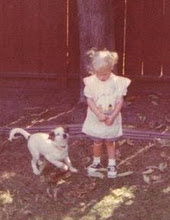
I truly love dogs, and I wish I could take on a gazillion clients all at once! Sadly, my busy schedule makes that pretty impossible (if only I had a clone...!) If you're looking for a fantastic trainer in your area, here are some of my personal tips that just might help you find the perfect fit:
1) Talk to your friends, family, a trusted groomer or vet (& even strangers with extraordinarily polite pups) and ask them for recommendations. Keep in mind that there are many large-scale businesses/ chain stores that offer dog training classes, so it's important to find out the name of the individual trainer your referral worked with (just as in any other industry, both wonderful and really really terrible employees can sometimes be working for the same company.)
2) Become familiar with the different methods of training before you begin your search, and then look for a trainer who uses techniques you feel most comfortable with. Be aware that there are some very opinionated trainers out there. I recommend looking for a trainer who uses terms like "I feel, I've found, I think, I believe, In my opinion, In my experience..." A confident trainer should be able to clearly explain his or her own personal training philosophy and the reasons behind it without becoming defensive... then let you decide if those techniques are something you feel comfortable with. Personally, I believe that positive reinforcement training is the best way to go, and so that's what I use with all my clients. I've found that students who are already drawn to that form of training have the best results with my techniques.
3) Most professional trainers who offer private lessons will be happy to talk with you over the phone or via email before you commit to lessons. Many will have a website with details regarding their background and training methods. Getting to know a bit about your trainer's personality and beliefs ahead of time may give you a better idea about what you might expect from them in person.
For instance, in addition to having gone through traditional dog trainer training, I've also been trained in pet first aid/CPR, animal assisted therapy, and have a certificate in Humane Education (from HSU.) You may find other trainers who, say, have protective/guard dog training backgrounds, etc. As you might imagine, the training processes would likely be different.
You might also find it helpful to ask about any "side jobs," education, or interests. In my case, I also work as a Naturalist (and have training in environmental education, native wildlife, etc.) I'm used to working with the public, and with children in particular ( Part of my job as a naturalist is teaching Nature-Based Preschool.) I majored in journalism and art in college. While this might seem unrelated to working with dogs, that background helped develop my observational skills, appreciation for detail, and communicative abilities; all of which give me a great advantage in my field.
4) Look for a trainer who truly likes dogs... and also truly likes people. It's strange to say, but many "dog people" aren't always too thrilled about interacting with their own species. It's important that your trainer works well with animals, and can also be warm, engaging, polite, and communicative with humans (like you!), too.









No comments:
Post a Comment